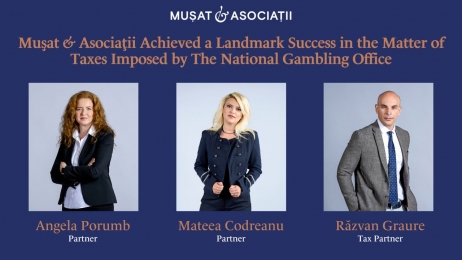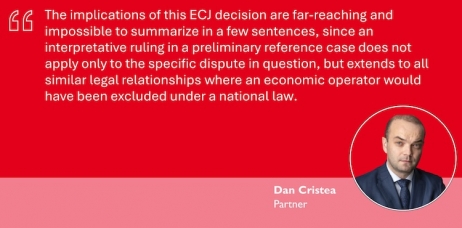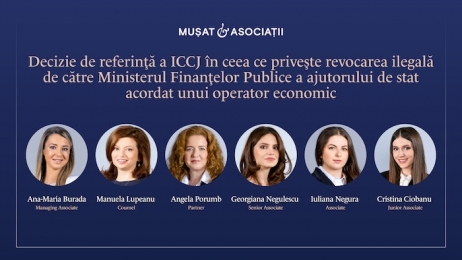
After three consecutive attempts, one of the main retailers present on the local market obtained the complete suspension of a taxation decision issued by ANAF. The taxpayer thus avoids the payment of late fees (0.01% per day of delay) regardless of the result of challenging the tax deed and obtains the return of the letter of bank guarantee. The successful victory of the team of lawyers of Radu and SPRL Associations, formed by Emanuel Băncilă, Alex Slujitoru and Ana Mihai, is all the more valuable as only 10% of the total suspension requests are admitted by the courts, and the same suspension had been previously rejected twice.
According to the legal provisions, there are two conditions that must be met for granting a court suspension: the taxpayer must prove a well-justified case and prove the existence of an imminent damage, if the tax decision is enforced.
Thus, in proving the first condition, the lawyers Radu and the Associations invoked the violation of some reference legal institutions regulated by the Fiscal Procedure Code, among them being also the exaggerated exceeding of the tax inspection duration, as well as the recent jurisprudence of the Court of Justice. of the European Union (CJEU) - Paper Consult case, to prove the appearance of illegality of the contested tax decision. As regards the second condition, the imminence of damage, the court acknowledged that the effect of the enforcement of the tax decision would have an immediate financial impact on the company.
The series of attempts to obtain the suspension of the taxation decision begins in 2015, the date on which the taxpayer requested the suspension from the phase of the tax appeal, but the supreme court rejected the request for suspension based on the provisions of art. 14 of the Law on Administrative Litigation.
In 2017, after the appeal was rejected by the tax authorities, the Court of Appeal again rejected as inadmissible a new application for suspension, retaining the power of decision in relation to the previous sentence of 2015. From the point of view of the Court, the company was in the hypothesis of a request for suspension successive to the one formulated in 2015, although the legal basis was different, namely Article 15 of the Law on Administrative Litigation compared to Article 14 of the same law used in 2015.
On appeal, the High Court contradicts the Court of Appeal's view, quashes the judgment of the first instance and remands the application for retrial, holding that, as long as the legal basis under which the suspension was requested a second time is different, even if the reasons are not , the application is admissible.
In the retrial, the Court of Appeal mentions the settled case law of the High Court, according to which there is a serious doubt as to the presumption of legality enjoyed by a tax decision, when important procedural provisions, such as jurisdiction or control, are violated. unconstitutional legal provisions declared as such.
However, such a criticism of the appearance of illegality was retained for procedural reasons only for one year of the controlled tax period. Therefore, the court found that the request for suspension was well-founded only in respect of that part of the debt which fulfilled, cumulatively, the requirements of the suspension and ordered the partial suspension of the taxation decision, which comprised only part of the debt and related accessories.
The court of first instance noted that the issuance of a control act in violation of unconstitutional legal provisions declared as such is sufficient to prove the appearance of illegality of the contested tax decision. However, it did not retain the same legal syllogism as regards the apparent illegality resulting from the breach of recent CJEU case law - the Paper Consult case, although one of the reasons for refusing the right to deduct VAT was the identification of inactive suppliers (in the Paper Consult case , The CJEU has expressly stated that the right to deduct VAT cannot be refused if the supplier is inactive).
Criticizing this solution in the appeal, Radu şi Asociații SPRL obtained the confirmation of the High Court of Cassation and Justice in the sense that, once the presumption of legality of the taxation decision is partially defeated, the solution required is the suspension of the decision. partial defeat of the presumption of legality, which would justify a solution of partial suspension of the contested fiscal administrative act.
"This interpretation is in accordance with the very reason of the legislator who, by establishing the possibility of judicial suspension of the administrative act, aimed to protect the recipients of the act by temporarily removing it from the civil circuit, until solving the criticisms of illegality made against it. The aim was to avoid the execution of an administrative act regarding which there are proven suspicions of illegality that could lead to its annulment ", concluded Emanuel Băncilă, Lawyer, Partner, Tax Policy and Controversy Leader, Radu and Asociații SPRL.



 October 28, 2020 12:17
October 28, 2020 12:17 










